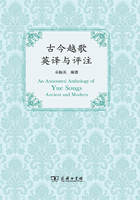
Comments and Annotations
The present song is an excerpt from The Miraculous and the Grotesque (《搜神记》) by Gan Bao (干宝, ?-336),which includes the romance of the the princess of Wu (Ziyu by name) and her lover Han Zhong (韩重). The first part of the romance, which may serve as an introduction to the song, may be simplified as follows:
Ziyu (紫玉), daughter of Ji Fuchai (夫差, the king of Wu, ?—473 BC), was both talented and beautiful. As she fell in love with a young man named Han Zhong, she exchanged greetings with him under the rose and pledged to marry him. Not long afterwards Han left for Qi and Lu to pursue his studies. At their son’s request Han’s parents went to the king to make a proposal of marriage on their son’s behalf, but the proposal was furiously rejected. Consequently Ziyu died of lovesickness. Han Zhong, sorrow-stricken when he returned three years later and found out what had happened, went to Ziyu’s tomb to cherish his memory of Ziyu with such sacrificial offerings as pork and joss paper. Out of Han’s expectation Ziyu’s soul came out sobbing from her tomb and, after imparting to him her ardent love for him and deep sorrow over the past, sang him the song.
This song expresses Ziyu’s ardent love for Han Zhong and undaunted pursuit for freedom, and denounces the social system which endues parents with the right to grab their children’s marriages in their own hands. The content of the song is touching, and the rhetorical devices tincture the language with force and vividness. The first four lines in the first stanza comprise two cases of analogy between the fanciful acts and the author’s aborted dream for love. As a rule, the poet chooses to mention or describe something in association with what he wants to say, and the technique is called “making associations” (兴). The first six lines in the second stanza, in which the author of the song implicitly likens herself to the faithful phoenix, are metaphorical.
The authorship of the song is controversial. Some scholars hold that it is spurious, while others, such as Zhu Changwen (朱长文, 1039—1098) of the Song Dynasty, argues that it was written by Ji Ziyu before her death. In any case, the aesthetic value and social significance of the song are undeniable.
For information about relevant records, please refer to Appendix II: The Romance of Ziyu — the Princess of Wu.